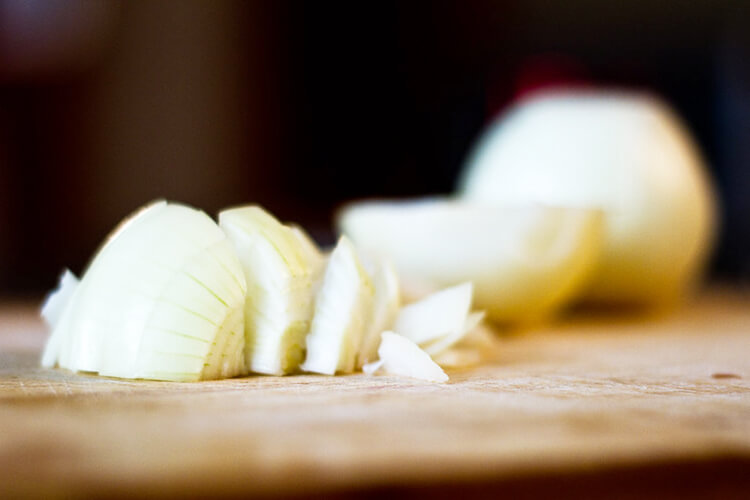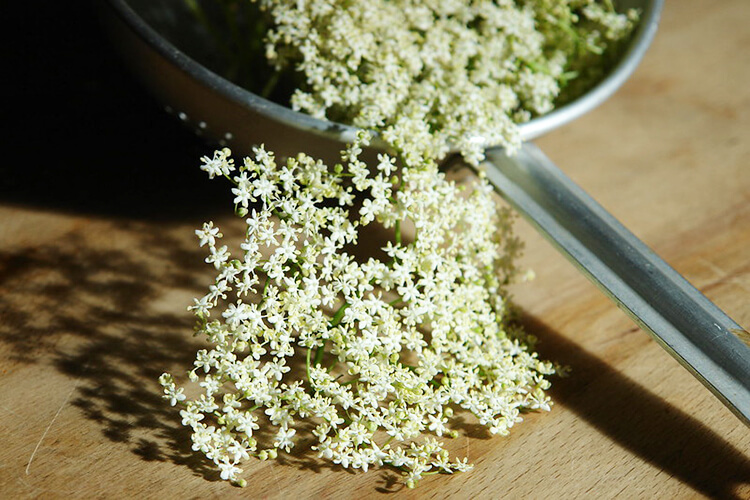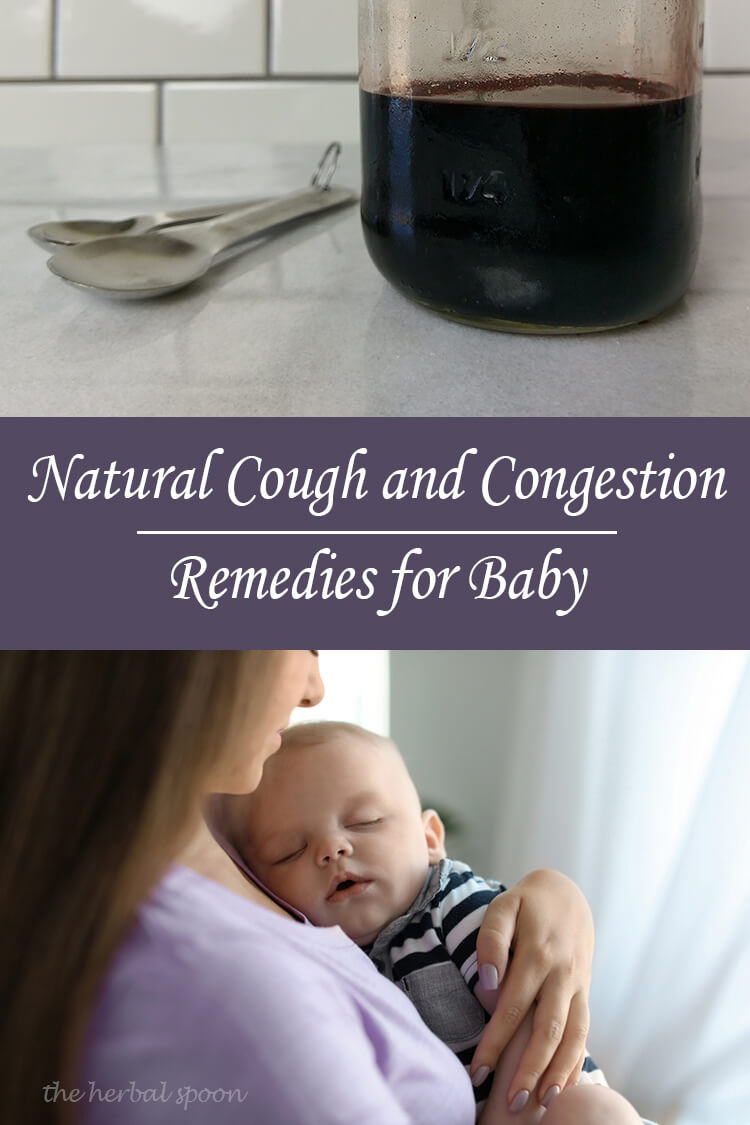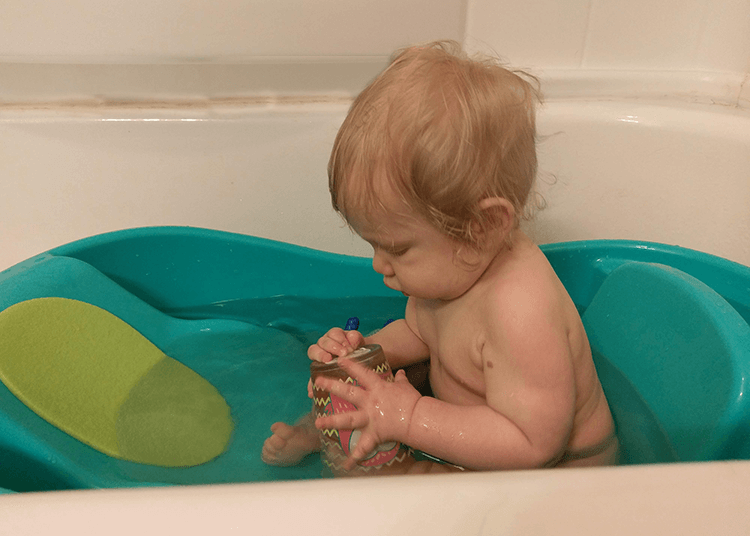When little ones struggles to breathe, it’s easy for panic to set in. Some herbal remedies, like this homemade sore throat spray, are great for adults, but not babies. So what home remedies for baby cough and congestion work?
This article covers:
- Which home remedies for baby cough are NOT safe
- Which essential oils are safe to diffuse for babies and how to use them
- The best herbal remedies to help clear baby congestion and cough fast
What do You Give an Infant for a Cough?
The FDA warns against conventional cough medicine for kids and I’m with them on this one. Cough medication can slow breathing and be life-threatening for infants. Some of these drugs contain opiates and most have artificial colors and flavors. Cough syrup for young children is not only unsafe, but ineffective (FDA, 2018).
Artificial colors are linked with behavioral issues, like hyperactivity, and are banned in other countries. Thankfully there are plenty of safe and effective home remedies for baby cough (Ravella, 2016).
Treat the Person, not the Symptoms
Unlike conventional medications, herbs work with the body to bring about wellness. Plant medicine works best when tailored to the individual, not just matching an herb to a condition. Is baby feverish, fussy, and has a dry cough? Or are they congested with lots of mucus, a wet cough, and no fever? Notice baby’s symptoms and use remedies tailored to their individual needs.
Not sure how much to use and how to dose? I give dosages for the herbal remedies below, but here are full details on how to figure dosing for all ages.
How to Safely Use Home Remedies for Baby Cough
“My experience has been that almost any herb that is safe for an adult is safe for a child as long as the size and weight of the child are accounted for and the dosage is adjusted accordingly. These herbs should be used in small amounts for short periods of time only , and in conjunction or formulated with milder herbs” – Rosemary Gladstar
When it comes to herb use for adults and babies, there are some major differences. Little ones need gentler options and certain preparations (like swallowing pills) are a no-go. It also doesn’t help to have a list of baby safe herbs if you don’t know how to use them.
Here’s how to use natural remedies for babies.
#1 – Dissolve homeopathic tablets in water and give the liquid to baby in a syringe.
#2 – Make a strong herbal infusion for baby’s bath water. Their skin absorbs the herbal properties and they breathe in the aromatic components. (Read on for some herbal bath recipes!)
#3 – Use a salve on baby’s chest or the bottoms of their feet. Some essential oils and herbs are too strong for a baby’s respiratory system when rubbed on their chest. When applied to the feet, young babies can still benefit from inhaling the salve, but it isn’t too close to their nose (Nuala, 2016).
#4 – Give herbal tea or syrup in a syringe. Infant syringes come with over the counter medications and infant supplements.
#5 – Breastfeeding mamas can take the herb and then nurse baby. Some herbal properties are excreted in breastmilk, but there’s more going on here. Studies have shown antibodies in breastmilk protect against infections and respiratory diseases (Jackson & Nazar, 2006).
What Causes Baby Congestion?
With tiny noses and respiratory systems, it’s easy for baby nasal congestion to set in. According to Mayo Clinic, baby congestion happens when nasal tissue becomes inflamed, or there’s too much mucus. When the respiratory system has mucus, our body tries to cough it up.
Instead of suppressing the body’s effort to get germs out, these remedies support it and promote clear breathing.
Home Remedies for Baby Cough
These time tested home remedies for baby cough and baby congestion help little ones breathe easy.
Nasal Wash
I’ve never seen a baby use a neti pot, but saline spray is the next best thing. Nasal washes help soften thick mucus and relieve baby congestion. Babies aren’t so great at blowing their nose either, but a nasal aspirator will take care of that.
- The Nose-Frida looks intimidating, but there’s a filter so you’re not actually sucking baby snot into your mouth.
- Xlear nasal spray contains the natural antibiotic xylitol.
- Genexa saline is formulated for babies, organic, and free of unnatural additives found in many saline sprays.
Moisture to Help a Congested Baby Sleep
A humidifier adds moisture to the air to help baby breathe at night. Be sure to clean humidifiers often or they can grow mold! A water based diffuser will add moisture to the air like a humidifier, but with the added benefit of essential oils. Be careful though: some essential oils, like eucalyptus and peppermint, are too harsh for babies (Dessinger, 2016).
Baby Safe Diffusing
Choose a kid safe blend, like this one, when diffusing around little ones. I use 2 drops and diffuse for a few hours at the most, not all night long, and not right next to baby’s face. You may want to save diffusing for the daytime to monitor for any reactions.
Here’s a list of baby safe essential oils to diffuse.
Baby safe essential oils for respiratory support
- Cedarwood, Virginian
- Blue tansy – helpful for baby congestion caused by pollen and environmental allergens.
- Copaiba
- Cypress
- Lemon eucalyptus
- Fir needle
- Helichrysum
- Pine
- Rosalina
- Spruce
Baby safe essential oils for immune support
- Dill
- Frankincense
- Tea tree
- Citrus oils (Bergamot, lemon, sweet orange, tangerine, grapefruit and lime)
- Cinnamon leaf (NOT bark)
Baby safe essential oils to calm
Baby safe essential oils to uplift the mood
- Basil
- Citrus oils (Bergamot, lemon, sweet orange, tangerine, grapefruit and lime)
- Lemon eucalyptus
Thyme Salve to Get Mucus Out of Baby’s Chest
Thyme is one of my favorite herbs to clear baby chest congestion. This herb is an expectorant to loosen and expel mucus, antiseptic, antibacterial, and antiviral. I use thyme essential oil for adults, but it’s too harsh for babies. Here are directions for how to make a salve, just substitute thyme for lavender in the recipe (Demotses, 2014).
To use the salve rub on baby’s chest or back. The regular thyme sold in the spice section at a grocery store is very expensive per ounce and isn’t medicinal quality. I get my thyme herb here and here. Thyme is ideal for wet, mucusy coughs, especially deep in the chest.

Onion Poultice
Onion doesn’t smell the best, but it’s a flu fighting powerhouse. The antimicrobial properties have been used for thousands of years to fight infection both internally and externally. Onions are also an expectorant to break up chest congestion and soothe baby cough. Your little one may smell like Italian food, but they’ll breathe better (WHO, 1999) (Libster, 2001).
How to make an onion poultice
- Chop up half an onion, add some water and simmer just until the onions are warm and soft.
- Wrap the warm (not hot!) onions in a tea towel or cheesecloth and use a rubber band to secure the top.
- Lay the poultice on the chest or upper back. Cover the poultice with a warm blanket, hot water bottle, or heating pad. Make sure it’s warm but not hot!
- Leave the onion poultice on for 20- 30 minutes and repeat every few hours as needed. This is a good time to wrap baby in a warm blanket and have some cuddles!
Herbs to Relieve Baby Cough
These herbs are safe for little ones, helps ease discomfort, and speed recovery.
Elderflower
The elder plant produces antiviral berries and flowers that are an effective flu remedy. Elderflower tea helps with respiratory infections and fevers. The tea encourages sweating (diaphoretic) and relaxes bodily tension to release heat.
Elder also helps expel phlegm from the lungs so it’s good to use when there’s both fever and congestion. Elderflower tea has to be used while it’s still warm or it loses its diaphoretic properties. For added immune support, throw some echinacea in the mix (McDonald, nd).
Echinacea
Echinacea is one of the most popular herbs for cold and flu season. This herb increases pathogen battling white blood cells in the body and stimulates the lymphatic system to help clear infection. While it’s great for overall immune support, echinacea doesn’t target breathing issues like coughing, congestion, or a runny nose.
Echinacea is most effective at the beginning of illness, not for prevention. You can give this herb every hour at the first sign of sickness to jump-start the immune system. (McDonald, nd) (Gladstar, 2015).

Elder and Echinacea Tea
This blend helps bolster the immune system and is useful when there’s both congestion and fever. The combination helps knock out respiratory infections as a helpful home remedy for baby cough.
- 1 teaspoon elderflower
- 1 teaspoon echinacea leaves or flowers
- 1 cup boiling hot water
- Combine all of the ingredients in a heat-safe mug or jar, like a mason jar. Cover and let steep for 5-10 minutes.
- Strain the herbs and allow to cool to a warm temperature before giving to baby.
Dosing:
- Babies 2-6 months old can take ½ Tablespoon 3-4 times daily
- Babies 6-12 months old can take 1 Tablespoon 3-4 times daily
Elecampane
This expectorant herb is useful for coughs and lung infections. Elecampane root is antimicrobial, expels congestion, soothes irritation from coughing, and encourages sweat to expel toxins. This herb doesn’t taste good on its own, but when combined with licorice, echinacea, and/or marshmallow root it makes for a tastier and more effective remedy (Gladstar, 2015). According to the Herbal Academy:
“Elecampane is indicated for damp, cold, congested, stuck conditions due to its stimulating, expectorant effect.”
Licorice Root for Throat Support
Because of its sweet taste and gentle nature, licorice is nicknamed the children’s herb. It’s the one I reach for whenever I have a sore throat. My kiddos can be picky about taking herbs, but licorice in the blend sweet talks them into it.
Licorice is antiviral, antibacterial, soothes coughing spasms, helps expel mucus, and soothes sore throats. The licorice root modulates the immune system and is a synergist to boosts the effects of other herbs in a formula. This herb is ideal for respiratory infections and dry, spastic coughs. (Winston & Maimes, 2007).
Elecampane congestion and cough tea
- 1 tsp elecampane root
- 1 tsp licorice root
- 2 cups purified water
- Combine the herbs and water in a pot and heat until boiling, then reduce to a simmer.
- Simmer the herbs for 20-30 minutes with the lid on, then strain into a measuring cup.
- Add more water if needed to get exactly 1 cup of tea.
Dosing:
- Babies 2-6 months old can take ½ Tablespoon 3-4 times daily
- Babies 6-12 months old can take 1 Tablespoon 3-4 times daily
Baby Coughing at Night
Coughing is often worse at night when baby is lying down. Here are some tips to help baby (and you!) catch some Z’s.
- Congested baby Sleep Position: Elevate the head of the crib mattress with a pillow or mattress wedge UNDER the mattress. A pillow in the crib with baby increases the risk of suffocation.
- Use a humidifier or safely diffuse while baby sleeps.
- Use a wild cherry herbal cough syrup (not the artificially colored chemical concoction in the drug aisle!) to ease nighttime coughing.
Herb Baths: A Home Remedy for Baby Cough
Warm steam from a bath or shower helps soften mucus and improve breathing. Warm water is great on its own, but the right herbs take it to the next level.
Here are some of the best herbs to use in the bath when baby is coughing and congested.
- Thyme – Antiviral, antibacterial, expels chest congestion.
- Rose hips and Hibiscus – Both are high in vitamin C for a healthy immune system.
- Elecampane – Antimicrobial, helps expel congestion, soothes irritation from coughing, and encourages sweating to expel toxins.
- Echinacea – Assists the immune system to fight infection.
- Licorice – An expectorant , anti-bacterial, anti-viral, antispasmodic, and helps other herbs work better.
- Bee balm – Antiviral, antibacterial and encourages sweating. Useful when there’s a fever, yet the person feels cold and clammy. Helps with coughing, sore throat, and baby chest congestion.
- Catnip – Helps calm and reduces a fever.
How to Make Bath Tea
Mix and match the herbs to get what your little one needs. I use about 3 Tablespoons of herbs total. Whole flowers like chamomile and bee balm are bulkier, so I’ll use closer to 1/3 of a cup total if these are in the mix.
Add strong herbal infusions to baby’s bath tub. If your little one uses a full sized tub, then double the amount of herb used. I prefer not to add the herbs directly to the bathwater, unless cleaning a thousand tiny plant pieces out of the tub is your thing.
Roots like elecampane and licorice should be decocted for 20 minutes, but the other herbs can be steeped for 10 minutes.
Here are some herbal bath tea recipes for baby cough and congestion support.
Calm a Fussy Baby
A fever means the body is working hard to kill pathogens and is usually a good thing. Sweating it out is often the best option, but sometimes the body needs a rest. Catnip calms and lowers a fever when baby is fussy and uncomfortable.
- 1 Tablespoon each lavender, chamomile and rose flowers
- 1 Tablespoons catnip (optional for if there’s a fever)
- 4 cups water
Bring water to a boil, steep the herbs for 10 minutes, then strain.
Soothe Baby Coughing
Fight germs, support the immune system, and cough the gunk up with this bath tea blend.
- 1 Tablespoon each Licorice and elecampane
- 2 Tablespoons rose hips OR hibiscus (you can use both if you like)
- 4 cups water
Add the licorice, elecampane and water to a pot. Bring to a boil, then reduce heat and simmer covered for 20 minutes. Turn the heat off, add the rosehips and steep covered for 10 minutes.
Herbal Bath for Congested Baby
This blend of herbs fights germs, expels mucus, helps the body sweat out toxins, and supports the immune system.
- 1 Tablespoon each thyme and echinacea (leaf or flowers)
- 2 Tablespoons bee balm flowers
- 4 cups water
Bring water to a boil, steep the herbs for 10 minutes, then strain.
Boost the Immune system
Echinacea supports the immune system while the rose hips and hibiscus add a boost of vitamin C.
- 2 Tablespoons echinacea leaves or flowers
- 1 Tablespoon rose hips OR hibiscus (you can use both if you like)
- 4 cups water
Bring water to a boil, steep the herbs for 10 minutes, then strain.
References
- Demotses, E. (2014). 8 Herbal home remedies for colds and flu. Retrieved from https://theherbalacademy.com/8-herbal-home-remedies-for-colds-and-flu/
- Dessinger, H. (2016). Safe essential oils for babies and children. Retrieved from https://www.mommyotamus.com/safe-essential-oils-babies-children/
- Food and Drug Administration. (2018, Nov 27). When to give kids medicine for coughs and colds. Retrieved from https://www.fda.gov/ForConsumers/ConsumerUpdates/ucm422465.htm
- Gladstar, R. (2015). Herbs for Children’s Health. Storey Publishing.
- The Herbal Academy. Herbarium monographs. Retrieved from https://herbarium.theherbalacademy.com/monographs
- Jackson, K. & Nazar, A. (2006, April). Breastfeeding, the immune response and long-term health. The journal of the American osteopathic association, 106, 203-207.
- Libster, M. (2001). Delmar’s integrative herb guide for nurses. Delmar Cengage Learning.
- McDonald, J. Herbcraft: Elder. Retrieved from https://www.herbcraft.org/elder.html
- McDonald, J. Herbcraft: Indications for commonly used herbs. Retrieved from https://www.herbcraft.org/commonherbs.html
- Nuala. (2016). Essential oils on the feet: Yes or No? Retrieved from http://www.engisharomatherapist.com/essential-oils-on-your-feet-yes-or-no/
- Ravella, S. (2016, July 7). Food doesn’t have to wear makeup: Food coloring has no purpose and plenty of negatives. Retrieved from https://slate.com/technology/2016/07/food-coloring-is-bad-for-us-but-the-fda-wont-admit-that.html
- Winston, D. & Maimes, S. (2007). Adaptogens: Herbs for strength, stamina, and stress relief. Rochester, VM: Healing Arts Press.
- World Health Organization. (1999). WHO Monographs on selected medicinal plants Volume 1: Bulbus Allii Cepae. Retrieved from http://apps.who.int/medicinedocs/en/d/Js2200e/3.html



Where do you purchase your herbs? This is all really helpful!!
I’m glad you found it useful 🙂 I usually get my herbs from Starwest Botanicals or Frontier
https://www.amazon.com/s?k=starwest+botanicals+herbs&crid=2R9FWD7G1J07K&sprefix=starwest+botanicals+herbs%2Caps%2C119&linkCode=ll2&tag=hotojuaban-20&linkId=74431a3a4b93019249a51ced7ea16975&language=en_US&ref_=as_li_ss_tl
https://www.amazon.com/stores/FrontierCo-op/page/49E39199-7C08-4148-A5D7-562A0A591E26?&linkCode=ll2&tag=hotojuaban-20&linkId=1ba90f66ca18a6b34744f3f392c901d7&language=en_US&ref_=as_li_ss_tl